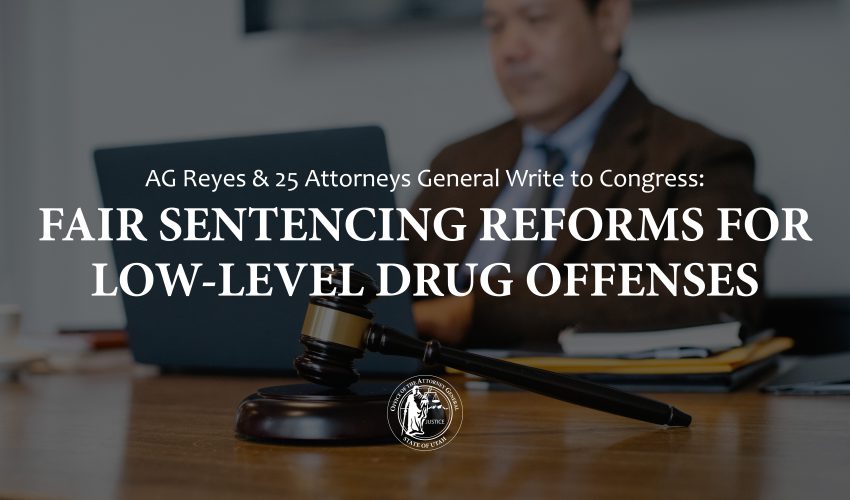SALT LAKE CITY – Utah Attorney General Sean D. Reyes has joined a bipartisan coalition to amend the First Step Act and extend critical resentencing reforms to individuals convicted of the lowest-level crack cocaine offenses.
The coalition, led by District of Columbia AG Karl Racine and Utah AG Sean Reyes, is calling on legislators to take this needed step in the wake of the Supreme Court’s recent decision in Terry v. United States, which held that certain mid-level and high-level crack cocaine offenders could seek resentencing under the law, but low-level offenders were not eligible.
“When Congress changed the law that treated crack cocaine and powder cocaine differently, we made great progress in addressing racial inequality in the criminal justice system,” said Attorney General Reyes. “Unfortunately, the sentencing reforms left the lowest-level offenders behind. “Very often, these sentences disproportionately affect persons of color, further undermining the stability of families in minority communities. We are urging Congress to extend these reforms to these offenders so they too may seek relief.”
The First Step Act, landmark criminal justice reform legislation, passed Congress with strong bipartisan support in 2018. One key reform aimed to correct injustices caused by the earlier crack cocaine vs. powder cocaine sentencing regime. That now-discredited regime punished users and dealers of crack cocaine much more harshly than users and dealers of powder cocaine, which disproportionately harmed communities of color.
In 2010, Congress had passed the Fair Sentencing Act to reduce the disparity between sentences for crack cocaine and powder cocaine. However, the law did not help the many people sentenced for crack cocaine offenses before 2010 who remained in prison. The First Step Act then included a provision that made previous drug sentencing reforms retroactive, allowing those serving harsh sentences imposed under the former federal law to seek relief.
U.S. Senators Richard J. Durbin, Charles E. Grassley, Cory A. Booker, and Mike Lee—the drafters of the First Step Act—confirmed in an amicus brief that the sentencing relief was intended to apply to all crack cocaine offenders sentenced before 2010. Nevertheless, in Terry v. United States, the Supreme Court concluded that while the First Step Act clearly authorized certain mid- or high-level crack cocaine offenders to seek resentencing, it failed to extend relief to the lowest-level offenders.
In today’s letter, the attorneys general urge Congress to close that gap and clarify that the sentencing relief provided by the First Step Act extends to all individuals convicted of crack cocaine offenses under the earlier regime, including the lowest-level offenders. They argue that there is no reason that only these low-level offenders should continue to serve sentences informed by now-discredited standards and that they should have an opportunity to seek a second chance.
A copy of the coalition’s letter to Congress is available here.
AG Racine and Utah AG Reyes led this letter and were joined by the attorneys general of California, Colorado, Connecticut, Delaware, Guam, Illinois, Iowa, Maine, Maryland, Massachusetts, Michigan, Minnesota, Nevada, New Jersey, New York, Oregon, Pennsylvania, Rhode Island, Vermont, Virginia, Washington, and Wisconsin.
###

